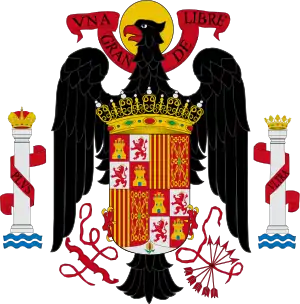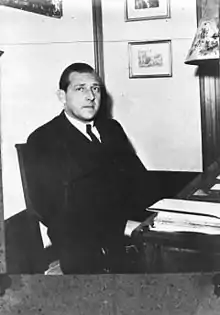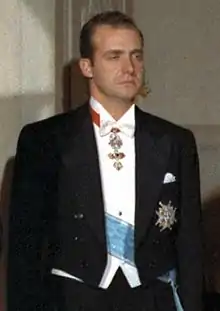Law of Succession to the Headship of the State
The Law of Succession to the Headship of the State (Spanish: Ley de Sucesión en la Jefatura del Estado) was the fifth of the eight Fundamental Laws of the Realm organizing the powers of the Francoist regime in Spain. It established provisions for the restoration of the Monarchy of Spain (after being abolished by the Second Spanish Republic in 1931), appointed Francisco Franco as the Head of State of Spain for life, and provided that his successor would be proposed by Franco himself with the title of King or Regent of the Kingdom, but that would have to be approved by the Cortes Españolas.
| Law of Succession to the Headship of the State Ley de Sucesión en la Jefatura del Estado | |
|---|---|
 Coat of arms of Spain between 1945 and 1977 | |
| Cortes Españolas | |
| Territorial extent | Spain (Francoist regime and transition) |
| Enacted by | Cortes Españolas |
| Enacted | 7 June 1947 |
| Commenced | 27 July 1947 |
| Repealed | 29 December 1978 |
| Legislative history | |
| Bill published on | 28 March 1947 |
| Introduced by | Franco III Government |
| Repealed by | |
| Constitution of Spain | |
| Related legislation | |
| Fundamental Laws of the Realm | |
| Summary | |
| Appointed Francisco Franco as the Head of State of Spain for life, and gave him the right to name his own successor | |
| Status: Repealed | |
The draft of the Law was sent by the Franco III Government to the Cortes on 28 March 1947. It had a short elaboration process and was approved by the Cortes in its session of 7 June 1947 and submitted to a referendum on 6 July 1947, coming into force on 27 July 1947.
Legal content
The fundamental and key objects of the Law were:[1][2]
- 1. Constituting Spain as the Kingdom and as a Catholic state (Article 1: "Spain, as a political unit, is a Catholic, social and representative State that, according to its tradition, is declared a Kingdom").
- 2. Converting the position of Head of State in a position for life in the person of Franco (Article 2: "The Head of State corresponds to the Leader of Spain and the Crusade, Generalissimo of the Armies, Don Francisco Franco Bahamonde").
- 3. Creating the Council of the Realm (Article 4).
- 4. Establishing the prerogative of the Head of State to propose to the Cortes, at any time, the person who should be called to succeed him, as a King or Regent and its possible revocation. (Article 6: "At any time the Head of State may propose to the Cortes the person he considers to be called to succeed him, as a King or Regent, with the conditions required by this Law, and may, likewise, submit to the approval of the former the revocation of the one proposed, even if it had already been accepted by the Cortes").
- 5. Defining and enumerating for the first time the body of the Fundamental Laws of the Realm that became a substitute for Rigid Constitution, whose repeal demanded the agreement of the Cortes and the confirmation by a referendum (Article 10).
The position of Infante Juan

The Manifesto of Lausanne
On 19 March 1945, Infante Juan, Count of Barcelona (son of the King Alfonso XIII and legitimate heir to the throne) published the Manifesto of Lausanne (in Lausanne, Switzerland) in which he harshly criticized the Francoist dictatorship and offered the Spanish people the possibility of restoring a monarchy whose character was poorly defined. In fact, he presented the constitutional monarchy as a moderate alternative to the regime, rejecting the Franco regime inspired by German and Italian totalitarian systems that have failed. He promised, in case of return to the monarchy, the approval of a new constitution, the recognition of human rights, the guarantee of public liberties, the establishment of a democratic legislative assembly, the recognition of the diversity, the amnesty of political prisoners and a fairer distribution of wealth.
It is for this reason that Franco hesitated to designate Infante Juan as a possible successor.[3][4][5]
On 31 March 1947, the then undersecretary of the Presidency Luis Carrero Blanco, envoy of Francisco Franco and editor of the Law of Succession, informed Infante Juan that with the approval of the Law of Succession it would be Franco who would appoint the monarch of the kingdom "when he considers it convenient". He also told Infante Juan that he could be "King of Spain, but of Spain of the Movimiento Nacional, which is Catholic, anti-communist and anti-liberal".
The Manifesto of Estoril
On 7 April 1947, Infante Juan published the Manifesto of Estoril (in Estoril, Portugal) in which he denounced the illegality of the Law of Succession, because it was proposed to alter the nature of the monarchy without consulting the heir to the throne.
First Manifest of Estoril by Don Juan, 7 April 1947
Spaniards:
General Franco has publicly announced his intention to present to the so-called Cortes a bill of the Law of Succession to the Headship of the State, under which Spain is constituted as a Kingdom and which provides for a system that goes completely against the laws that have historically settled the succession of the Crown.
In these moments so critical of the political stability of the Fatherland, I can not, being the legitimate representative of your Monarchy, do not address you to indicate my attitude to such a serious project.
The principles governing the succession of the Crown, which are among the elements underlying the legality on which the Traditional Monarchy is based, can not be changed without the joint action of the King and the Nation legitimately represented in the Cortes. What they are trying to do now is not based on any of these two essential elements, since neither the holder of the Crown can intervene nor can it be said that the organization bearing the name of Cortes embodies the will of the Nation since it is only a government creation. The Law of Succession which would arise under such conditions would be marked by a substantial defect of nullity.
The substantive question that the project raises is just as serious, if not more so. Without taking into account the urgent need for Spain to have stable institutions, without wanting to state that what the country wants is to get out as quickly as possible of a situation which is getting more dangerous on a daily basis, without understanding that the international hostility which the country is surrounded with is largely due to the presence of General Franco as the head of state, what they want to do now is purely and simply transform this personal dictatorship into a dictatorship for life, ratify some titles that seemed until now precarious and enjoy, under cover of the glorious name of the Monarchy, a regime of pure governmental arbitrariness, which has not been necessary for a long time.
Tomorrow history and today the Spaniards would not forgive me if I remained silent in the face of the attack that one tries to perpetrate against the very essence of the institution of the hereditary monarchy, which is, in the words of Balmes, one of the greatest and happiest conquests of political science.
Hereditary monarchy is, by nature, one of the basic elements of stability through the institutional permanence that triumphs over the disappearance of persons and, thanks to the fixity and clarity of the principles of succession, eliminate the motives of discord and make impossible the confrontation of appetites and clans.
All these supreme advantages disappear in the succession bill, which transforms fixity into imprecision, opens the door to all internal struggles and abstracts hereditary continuity and returns, in a lamentable spirit of regression, to one of these imperfect formulas of electoral caudillism, in which the people have tragically debated themselves at the dawn of their political life.
The moment is too serious for Spain to add a new constitutional fiction to those which are today part of the provisions that they want to pass for the organic laws of the Nation and which moreover have never been applied in essence.
Faced with this attempt, I have the absolute duty to affirm publicly and solemnly the supreme principle of legitimacy that I incarnate, of the imprescriptible rights of sovereignty that the Providence of God intended to attribute to me and that I can not because they come from many centuries of history and are directly related to the present and the future of our Spain.
For the same reason as that for which I have the supreme hope of being the King of all Spaniards who wish to act in good faith to obey a Rule of Law inspired by the essential principles of the life of the Nation and which obliges both the rulers and the subjects, I have been and am willing to facilitate anything that would ensure the normal and unconditional transmission of powers. I can not be asked to give my assent to acts which would imply the non-fulfillment of the sacred duty of guardian of the rights which are not only those of the crown but which are part of the spiritual patrimony of the Fatherland.
With blind faith in the great destiny of our beloved Spain, know that you can always count on your King.
JUAN
Estoril, 7 April 1947
Referendum
On 6 July 1947 a referendum was held on the Law, in which, according to the official results, the electorate was composed of 16,187,992 voters. Of them, 14,454,426 voted, of which 12,628,983 (89.86% of the voters) voted affirmatively and 643,501 negatively.[6]
Consequences
.jpg.webp)
From 18 July 1947, by virtue of the Law of Succession, Franco would act as the Head of State of the newly proclaimed Kingdom of Spain, whose throne was vacant and thus would have to remain so at least until the occurrence of what was later called the "succession event", a euphemism for the death of the dictator.
On 25 August 1948, Franco arranged a meeting with Infante Juan, on his holiday yacht El Azor, in the Bay of Biscay. There they agreed that Infante Juan's ten-year-old son, Juan Carlos, born and residing in Rome, Italy would change his residence and complete his education in Spain, along with his brother Alfonso, under the promise of "that the monarchist newspaper ABC could inform freely and that the restrictions of monarchist activities would be lifted".
On 9 November 1948 Juan Carlos was received by Franco at his residence in the Royal Palace of El Pardo, where he informed him that his education would be in charge of a group of professors with firm loyalty to the Movimiento Nacional.
As revealed by the documents declassified by the United States Department of State, due to an accident that occurred on 24 December 1961, during a hunt in the forests of El Pardo, Franco begun to consider the election of his succession. As report from the Greek royal court to the US ambassador in Greece indicates: "following a hunting accident" we are informed that "it is in planning to present the question of the royal succession before the Cortes in February. He has not divulged whether he will recommend the Count of Barcelona or his son, Juan Carlos"; conforming to what was indicated by the Spanish ambassador Luca de Tena.

Finally, on 22 July 1969, Franco designated Juan Carlos (skipping the natural order of succession that corresponded to his father Infante Juan under the law of succession according to which it would be Franco who would name the monarch of the kingdom) as his successor to the Headship of the State, with the title of "Prince of Spain".[7] He is proclaimed by the Cortes as Franco's successor on the same day, when Juan Carlos took an oath of "fidelity to the principles of the National Movement and other Fundamental Laws of the Realm".
Aftermath
During the dictatorship, as the Prince of Spain, Juan Carlos acted briefly (from 19 July to 2 September 1974) as the Head of State due to the fragile health of Franco because of Parkinson's disease.
Franco died on 20 November 1975, and Juan Carlos was proclaimed head of state and crowned as King of Spain on 22 November 1975 at the Palacio de las Cortes, with the regnal name Juan Carlos I, skipping the natural succession order (which corresponded to his father Infante Juan). As a result, the political reforms transformed the Francoist apparatus into a democratic system whose political form of government is the parliamentary monarchy, with a head of state that is subordinated to the constitution and where its acts have to be endorsed (the King reigns but does not govern),[8][9] and a parliament elected by the people with which the legislative power rests.
It would not be until 14 May 1977 when Infante Juan officially renounced all his dynastic rights (which had been denied by the Law of Succession created by Franco) in favor of his son. The Law of Succession was repealed on 29 December 1978, more than a year and a half after the renouncement of Infante Juan.
References
- Solé Tura, Jordi (1972). Introducción al régimen político español (in Spanish) (II ed.). Esplugues de Llobregat: Ariel. p. 35.
- Izquierdo Collado, Juan de Dios (1984). El referéndum de 1947. Antecedentes del Referéndum de la Ley de reforma Política de 1976 (PDF) (in Spanish). Revista de estudios albacetenses. p. 179–204. Retrieved 20 January 2019.
- "Don Juan, el heredero que no pudo reinar". El País. 31 March 2013. Retrieved 20 January 2019.
- "Don Juan". Archived from the original on 26 March 2014. Retrieved 20 January 2019.
- Preston, Paul (15 November 2012). Juan Carlos. El rey de un pueblo (in Spanish). ISBN 9788497932011. Retrieved 20 January 2019.
- "La gran votación favorable a la Ley Sucesoria, facilmente percibida el domingo se cifraba anoche en un setenta y dos por ciento del censo" (in Spanish). ABC. 8 July 1947. p. 15. Retrieved 20 January 2019.
- Ley 62/1969 Boletín Oficial del Estado (BOE) (in Spanish)
External links
- Ley de Sucesión en la Jefatura del Estado de 1947 (pdf) (in Spanish)
- Corrección de errata en dicha ley (pdf) (in Spanish)
- Ley de Sucesión en la Jefatura del Estado de 1947 (in Spanish)
- Extracto del Manifiesto de Lausana (pdf) (in Spanish)